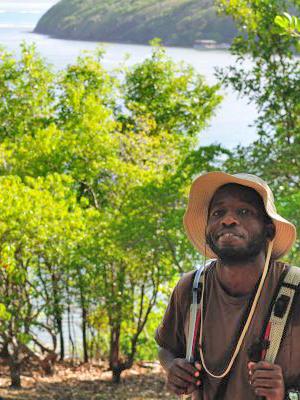Half a world away from the beautiful Caribbean island of St Lucia, Lenn Isidore felt right at home with his address in Australia.
His destination: The University of Queensland’s St Lucia campus in Brisbane. The campus is situated in an inner-city suburb originally named for the West Indian island, because of early sugar cane farming in the area.
But Lenn wasn’t on campus long, because as a student in UQ’s Master of Conservation Biology program, he was soon immersed in exciting field experiences.
“My most memorable experience at UQ is indeed the most memorable of my lifetime,” he says.
“The seven days spent at the UQ Heron Island Research Station (within the Great Barrier Reef) were mind-blowing.
“On a typical day, after a breath-taking sunrise, we would encounter eagle rays, sting rays, a few different shark species, lionfish and two or three turtle species while snorkelling.
“At the day’s end, after a glorious sunset, we would sit under the stars and watch turtles come onto the beach to bury their eggs. We were also privileged enough to witness turtle hatchlings making their way from their sandy nests to the sea.”
Other enthralling periods during his time as a student in Australia included exploring Kakadu National Park in Australia’s Northern Territory; seeing humpback whales, dolphins, koalas and kangaroos, all for the first time during a single field trip to North Stradbroke Island near Brisbane; and handling venomous snakes at two snake-handling training sessions.
Lenn says UQ’s Master of Conservation Biology program was the “perfect launching pad for a career in conservation.”
“The value of this program cannot be overstated,” he says.
“The course is brilliantly put together, the content is well delivered and the field trips serve as powerful reminders of what it is that we as conservationists are fighting to save.”
Lenn didn't choose this area of study: “It essentially chose me,” he explains.
“I had an innate fascination with wildlife at a very tender age and this interest has never waned.
“My journey to formal studies in conservation, however, was far from direct and I embarked on undergraduate studies in computer science, years of teaching at a secondary school and employment with the wildlife department of my country before commencing studies at UQ.”
He chose his program at UQ because it promised a comprehensive approach to conservation science. It included lectures by world-leading conservation scientists and field trips to fascinating locations at which various survey skills could be honed. The program also promised a strong emphasis on statistical analysis, scientific writing and the delivery of oral presentations.
What advice would Lenn offer to students wanting to study at UQ?
“Take the plunge and invest in an educational experience that can by rivalled by few other universities,” he says.
“Make the most of the UQ experience and get involved in one or more of the numerous clubs on campus.”
Lenn’s short-term plans involve time in industry, working with conservation non-government organisations. He is hoping for a longer-term research-oriented career in academia.

